Related Research Articles
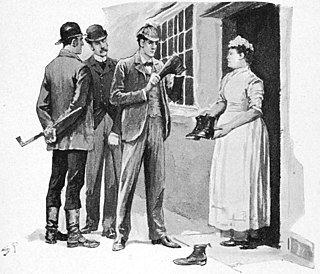
Detective fiction is a subgenre of crime fiction and mystery fiction in which an investigator or a detective—whether professional, amateur or retired—investigates a crime, often murder. The detective genre began around the same time as speculative fiction and other genre fiction in the mid-nineteenth century and has remained extremely popular, particularly in novels. Some of the most famous heroes of detective fiction include C. Auguste Dupin, Sherlock Holmes, Kogoro Akechi, and Hercule Poirot. Juvenile stories featuring The Hardy Boys, Nancy Drew, and The Boxcar Children have also remained in print for several decades.

Crime fiction, detective story, murder mystery, mystery novel, and police novel are terms used to describe narratives that centre on criminal acts and especially on the investigation, either by an amateur or a professional detective, of a crime, often a murder. Most crime drama focuses on criminal investigation and does not feature the courtroom. Suspense and mystery are key elements that are nearly ubiquitous to the genre.

The historical mystery or historical whodunit is a subgenre of two literary genres, historical fiction and mystery fiction. These works are set in a time period considered historical from the author's perspective, and the central plot involves the solving of a mystery or crime. Though works combining these genres have existed since at least the early 20th century, many credit Ellis Peters's Cadfael Chronicles (1977–1994) for popularizing what would become known as the historical mystery. The increasing popularity and prevalence of this type of fiction in subsequent decades has spawned a distinct subgenre recognized by the publishing industry and libraries. Publishers Weekly noted in 2010 of the genre, "The past decade has seen an explosion in both quantity and quality. Never before have so many historical mysteries been published, by so many gifted writers, and covering such a wide range of times and places." Editor Keith Kahla concurs, "From a small group of writers with a very specialized audience, the historical mystery has become a critically acclaimed, award-winning genre with a toehold on the New York Times bestseller list."
John Dickson Carr was an American author of detective stories, who also published using the pseudonyms Carter Dickson, Carr Dickson, and Roger Fairbairn.

The "locked-room" or "impossible crime" mystery is a type of crime seen in crime and detective fiction. The crime in question, typically murder, is committed in circumstances under which it appeared impossible for the perpetrator to enter the crime scene, commit the crime, and leave undetected. The crime in question typically involves a situation whereby an intruder could not have left; for example the original literal "locked room": a murder victim found in a windowless room locked from the inside at the time of discovery. Following other conventions of classic detective fiction, the reader is normally presented with the puzzle and all of the clues, and is encouraged to solve the mystery before the solution is revealed in a dramatic climax.
This article contains information about the literary events and publications of 1934.
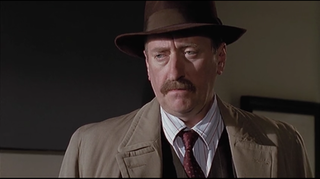
Inspector James Japp is a fictional character who appears in several of Agatha Christie's novels featuring Hercule Poirot.
"The Adventure of the Black Baronet" is a Sherlock Holmes murder mystery written by Adrian Conan Doyle and John Dickson Carr. The story was published in the 1954 collection The Exploits of Sherlock Holmes. It was first published in Collier's on 23 May 1953, illustrated by Robert Fawcett.
Edward Dentinger Hoch was an American writer of detective fiction. Although he wrote several novels, he was primarily known for his vast output of over 950 short stories. He was one of the few American fiction writers of his generation who supported himself financially through short story publication, rather than novels or screenplays.
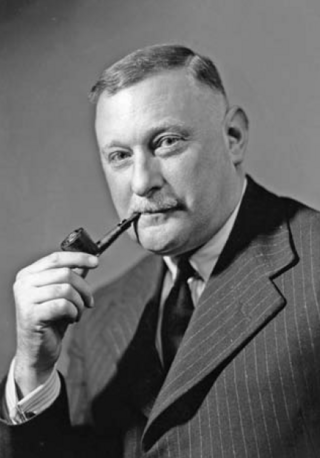
Cecil John Charles Street, better known as John Street, was a major in the British Army and a crime fiction novelist.
Otto Penzler is an American editor of mystery fiction, and proprietor of The Mysterious Bookshop in New York City.

The Lamp of God is a novella by Ellery Queen that was originally published in the Detective Story Magazine in 1935. Later, it was collected in the short story collection The New Adventures of Ellery Queen in 1940. Finally, it was published as a standalone book by Dell Books in 1950.

The Punch and Judy Murders is a 1936 mystery novel written by John Dickson Carr under the alias of Carter Dickson. It is a whodunnit which features the fictional detective Sir Henry Merrivale. It was the last book read by the former American president Franklin D. Roosevelt before his death.
And So to Murder is a mystery novel by the American writer John Dickson Carr, who published it under the name of Carter Dickson. It is a whodunnit and features the series detective Sir Henry Merrivale and Scotland Yard Chief Inspector Humphrey Masters.
He Wouldn't Kill Patience is a mystery novel by the American writer John Dickson Carr, who published it under the name of Carter Dickson. It is a locked room mystery and features the series detective Sir Henry Merrivale and his long-time associate, Scotland Yard's Chief Inspector Humphrey Masters.
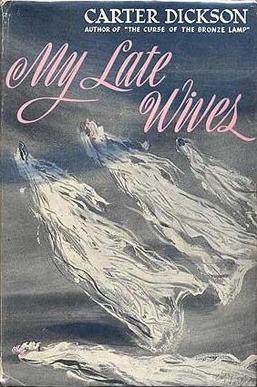
My Late Wives is a mystery novel by the American writer John Dickson Carr, who published it under the name of Carter Dickson. It is a whodunnit featuring the series detective Sir Henry Merrivale and his long-time associate, Scotland Yard's Chief Inspector Humphrey Masters.

The Witch of the Low Tide, first published in 1961, is a detective story/historical novel by John Dickson Carr set in the England of 1907. This novel is a mystery of the type known as a locked room mystery as well as being a historical novel.
Colonel March of Scotland Yard is a British television series consisting of a single series of 26 episodes first broadcast in the United States from December 1954 to Spring of 1955. The series premiered on British television on 24 September 1955 on the newly opened ITV London station for the weekends Associated Television. It is based on author John Dickson Carr's fictional detective Colonel March from his book The Department of Queer Complaints (1940). Carr was a mystery author who specialised in locked-room whodunnits and other 'impossible' crimes: murder mysteries that seemed to defy possibility. The stories of the television series followed in the same vein with March solving cases that baffle Scotland Yard and the British police. The department itself is sometimes referred to as "D3". Boris Karloff starred as Colonel March.
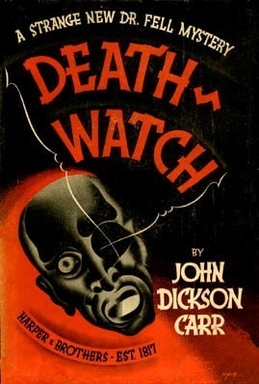
Death-Watch, first published in April 1935, is a detective story by American writer John Dickson Carr, featuring his series detective Gideon Fell. It is a mystery novel of the whodunnit type.
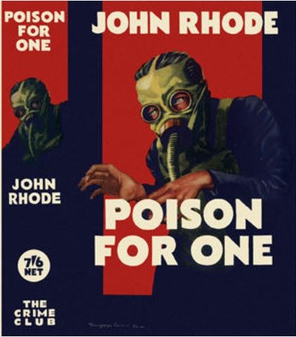
Poison for One is a 1934 detective novel by John Rhode, the pen name of the British writer Cecil Street. It is the eighteenth in his long-running series of novels featuring Lancelot Priestley, a Golden Age armchair detective. It combines elements of the locked room mystery and country house mystery.
References
- ↑ Joshi, S. T. (1990). John Dickson Carr: A Critical Study. Popular Press. pp. 76–77. ISBN 9780879724771.
- ↑ Evans, Curtis (2012). Masters of the "Humdrum" Mystery: Cecil John Charles Street, Freeman Wills Crofts, Alfred Walter Stewart and the British Detective Novel, 1920-1961. McFarland & Company. p. 90. ISBN 978-0786470242.
- ↑ Penzler (editor), Otto (2014). The Black Lizard Big Book of Locked-Room Mysteries. Black Lizard. p. 101. ISBN 978-0307743961.
{{cite book}}:|last=has generic name (help)